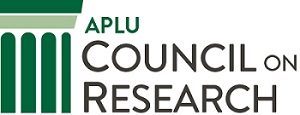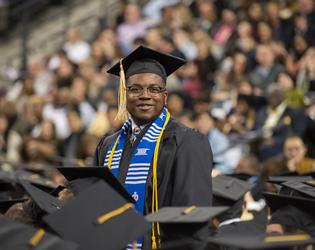
CoR NEWSFebruary 28, 2017
To: APLU Council on ResearchFrom: APLU CoR Staff
- CoR in the News
- Smith Announces Priorities for 115th Congress
- House Passes H.R. 589, DOE Research and Innovation Act
- Scientific Integrity Act Introduced
- APLU Sends Letter Urging Congress to Complete FY17 Appropriations
- TFAI Letter to OMB Director Mick Mulvaney
Several CoR Executive Committee members recently participated in media and Capitol Hill visits while in Washington, D.C. for the annual CoR Executive Committee Meeting. CoR Executive Committee members Kalliat Valsaraj (Louisiana State University) and David Conover (University of Oregon) were quoted last Thursday (February 23rd) in email newsletters sent by The Chronicle of Higher Education and POLITICO.
From The Chronicle’s “Your Daily Briefing” email:
Growing competition abroad.
Research vice presidents representing the nation’s public universities are in Washington for an annual lobbying visit, and like others they’re looking for some basic answers about what’s happening on Capitol Hill and at the White House. The visiting research VPs have the usual concerns about federal funding levels and regulatory relief. And as they made clear in a briefing for reporters on Wednesday, they’re especially worried about the anti-immigrant atmosphere they’re seeing right now.
Kalliat Valsaraj, who is vice president for research and economic development at Louisiana State University, said the political climate is exacerbating a problem that American institutions already faced from growing competition abroad. Mr. Valsaraj said he had just returned from India, where he saw Australian universities advertising for students. U.S. institutions typically hadn’t bothered, feeling their reputations provided enough of a draw. “That really doesn’t sustain our arguments any more,” he said. —Paul Basken
From POLITICO’s Pro Education email:
COLLEGE RESEARCH CHIEFS HIT THE HILL: As the Trump administration prepares its first budget — the outline for which is expected in the second full week of March — officials who oversee research at public universities are hoping to make a business-minded pitch for more funding: that “smart businesses reinvest” in research to stay ahead of the game. “If you think about the background our new president comes from — bringing a business perspective into government — this shouldn’t be a difficult idea to sell,” said David Conover, vice president for research and innovation at the University of Oregon. “If we’re going to remain a nation that’s on the cutting edge of nations in R&D, we have to also invest back in that.”
— A dozen vice presidents for research from major public research universities are meeting with lawmakers this week to ask for more money. They’re part of the APLU’s Council on Research Executive Committee, which meets each February in D.C.
— The Trump administration is the elephant in the room at this year’s meeting, and the university leaders were frank in a talk with reporters Wednesday, saying there are a lot of concerns among faculty about how the administration’s policies might influence their work. “It’s no secret that faculty are a little antsy,” said Kalliat Valsaraj, vice president for research and economic development at Louisiana State University. “They all wonder where the policies are going to go, where the funding is going to go. … We’re all, as leaders, trying to remain calm. We have an opportunity to influence.”
— The research chiefs are worried about what they call a “dangerous” politicization of funding. Rep. Lamar Smith (R-Texas.), the chair of the House Science Committee, is again calling for oversight of National Science Foundation spending, writing this month that “NSF has funded too many projects that are at best marginal or at worst frivolous and wasteful.” The university VPs said they’re worried that could be a harbinger of a congressional push to exert power over which scientific research gets funded. “How do we decide what’s in the national interest? And who should make those decisions?” Conover said. “If it’s politics that are making those decisions — for instance, certain kinds of science that might not align with the politics of a particular administration — that could a very dangerous direction.”
House Science, Space and Technology Committee Chairman Lamar Smith (R-TX) has announced his five top priorities for the new Congress. He stated that “The Science Committee plans to create transparent environmental policies based on sound science and focused on innovation rather than regulation,” and that “The committee will work to make sure every agency research dollar spent works for the taxpayers who fund them. We’ll work to re-stake America’s leadership in STEM concentrations by crafting critical science education initiatives, and we will conduct rigorous oversight of cybersecurity standards and breaches at federal agencies to ensure all Americans’ private information is secure. Rebalancing NASA’s portfolio and setting course for its future successes will also be a key priority this Congress.”
Late last month, the House passed by voice vote H.R. 589, the Department of Energy (DOE) Research and Innovation Act which would establish DOE policy for science and energy research programs and development activities. This bill is the result of a bipartisan, bicameral agreement reached during last session’s Energy Policy Modernization Act conference. H.R. 589 would improve DOE technology transfer activities, authorize the Energy Innovation Hubs established by the Obama administration, help the Advanced Research Projects Agency-Energy (ARPA-E) better partner with the private sector, authorize biological systems science research activities, direct the Office of Science to enable DOE’s applied energy research programs to better leverage its unique advanced computing capabilities, and authorize applied mathematics and software development for high-end computing systems, among other provisions.
Senate Commerce Committee Ranking Member Sen. Bill Nelson (D-FL) recently introduced S. 338, the Scientific Integrity Act which aims to ensure federal agencies have strong scientific integrity policies in place. If passed, the bill would require all agencies to have policies that protect federal scientists’ ability to communicate freely with the media and policymakers and protect against political manipulation of scientific research or misrepresentation of findings and data.
Last week, APLU President Peter McPherson sent a letter to Congressional leadership urging the completion of the Fiscal Year 2017 appropriations process with legislation that prioritizes funding for higher education and research. The letter expresses concern that a year-long CR would forgo the opportunity to adopt Congressionally proposed changes and updates, including needed increases for research, student aid, and other important programs.
Last week, the Task Force on American Innovation (TFAI) which includes APLU, sent a letter to Office of Management and Budget (OMB) Director Mick Mulvaney. The letter urges Director Mulvaney to make federal investments in basic scientific research a top priority in Fiscal Year 2018 at the agencies of focus for TFAI, including the National Science Foundation, the Department of Energy Office of Science, the Department of Defense, NASA, and the Department of Commerce’s National Institute of Standards and Technology.




Stay Connected
X (formerly Twitter)
Facebook
YouTube
LinkedIn
RSS